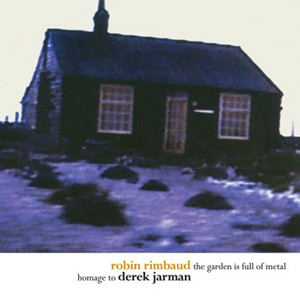 Initially released in 1997, three years after Derek Jarman's passing, The Garden Was Full of Metal was a fitting tribute to the legendary director. It also, however, helped to demonstrate that Robin Rimbaud was a musician with a more significant artistry than solely relying on the novelty of presenting covertly recorded wireless phone conversations. Reissued for the 20th anniversary of Jarman's death, with four additional songs from the same sessions, it remains an extremely personal tribute to one artist from another.
Initially released in 1997, three years after Derek Jarman's passing, The Garden Was Full of Metal was a fitting tribute to the legendary director. It also, however, helped to demonstrate that Robin Rimbaud was a musician with a more significant artistry than solely relying on the novelty of presenting covertly recorded wireless phone conversations. Reissued for the 20th anniversary of Jarman's death, with four additional songs from the same sessions, it remains an extremely personal tribute to one artist from another.
Intimacy was always a major facet of Rimbaud's work as Scanner, but here he turns that inward, via an emotional tribute to an artist whom he was heavily inspired by.It might not be as an overt as secretly recorded telephone calls were, but there is an extremely personal and poignant gravitas in these recordings.Rimbaud speaks of these compositions as "sound Polaroids," utilizing recordings of places and locations important in Jarman's life as source material, with a restrained use of instrumentation and relatively simple processing and effects.Interspersed with this are excerpts from various Jarman interviews throughout the years.
"Experience" exemplifies the approach of this album, with its layered voice samples and basic keyboard sounds that fold back into themselves.The arrangement may be simple, but the result is beautiful."Drop" sees Rimbaud using both instrument and voice samples, largely reversed and paired with a brittle but memorable drum loop that is one of the few things that dates this album as from the late 1990s.Rhythms are used sparingly throughout the album otherwise, mostly via processed sounds or synth patterns. On "Their Own Space" the beat is generated from either a treated sample or bit of keyboard tone that makes for a nice contrast to the more mournful electronic sounds.
On a piece such as "Fravaer," the rhythm is less overt and more insinuated via light thumping noises that accompany string swells and what sounds to be field recording loops.The same feel bleeds into "Rosa Rugosa," with a simple skittering click sample as percussion with dramatic piano and strings that could easily be a film score piece.
The four newly added songs from the same sessions fit in beautifully with the remainder of the work."Circles of Stone" is another passage of melancholy synthesizers that are filmic without being unnecessarily dramatic."Translucence" is a short but sweet piece of new age-y electronics mixed with interview fragments, and "I Waited a Lifetime" is admittedly more skeletal than the remainder of the album, but its slowly progressing piano fits the album’s mood perfectly.The final piece, "Garden (Redux)" seems to be a mix of the album as a whole, and while it clearly has a sound collage feeling to it, it fits together better than most of this sort.
Even 17 years after its first issue, The Garden is Full of Metal retains all of the reverence and celebration of Jarman's life that it intended.Additionally, Robin Rimbaud's work remains just as distinct and powerful as it did then, and with the additional material added, the result being richer and more fully realized.It is a perfect example of how an artist and composer who is creating something so intimate and personal that it can transcend time and technology, a description that is apt for both Rimbaud and Jarman's art.
samples:
 
Read More

